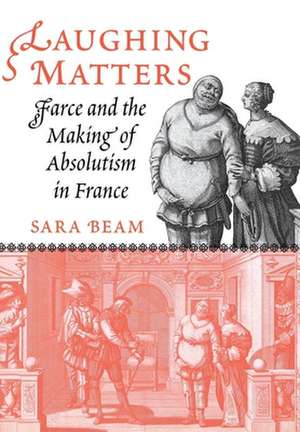Laughing Matters – Farce and the Making of Absolutism in France
Autor Sara Beamen Limba Engleză Hardback – 3 apr 2007
Sara Beam, in revealing how theater and politics were intimately intertwined, shows how the topics we joke about in public reflect and shape larger religious and political developments. For Beam, the eclipse of the vital tradition of satirical farce in late medieval and early modern France is a key aspect of the complex political and cultural factors that prepared the way for the emergence of the absolutist state. In her view, the Wars of Religion were the major reason attitudes toward the farceurs changed; local officials feared that satirical theater would stir up violence, and Counter-Reformation Catholicism proved hostile to the bawdiness that the clergy had earlier tolerated.
In demonstrating that the efforts of provincial urban officials prepared the way for the taming of popular culture throughout France, Laughing Matters provides a compelling alternative to Norbert Elias's influential notion of the "civilizing process," which assigns to the royal court at Versailles the decisive role in the shift toward absolutism.
Preț: 510.45 lei
Preț vechi: 662.92 lei
-23% Nou
Puncte Express: 766
Preț estimativ în valută:
97.69€ • 106.07$ • 82.06£
97.69€ • 106.07$ • 82.06£
Carte tipărită la comandă
Livrare economică 23 aprilie-07 mai
Preluare comenzi: 021 569.72.76
Specificații
ISBN-13: 9780801445606
ISBN-10: 0801445604
Pagini: 280
Dimensiuni: 164 x 241 x 25 mm
Greutate: 0.55 kg
Editura: MB – Cornell University Press
ISBN-10: 0801445604
Pagini: 280
Dimensiuni: 164 x 241 x 25 mm
Greutate: 0.55 kg
Editura: MB – Cornell University Press
Descriere
Sara Beam, in revealing how theater and politics were intimately intertwined, shows how the topics we joke about in public reflect and shape larger religious and political developments.
